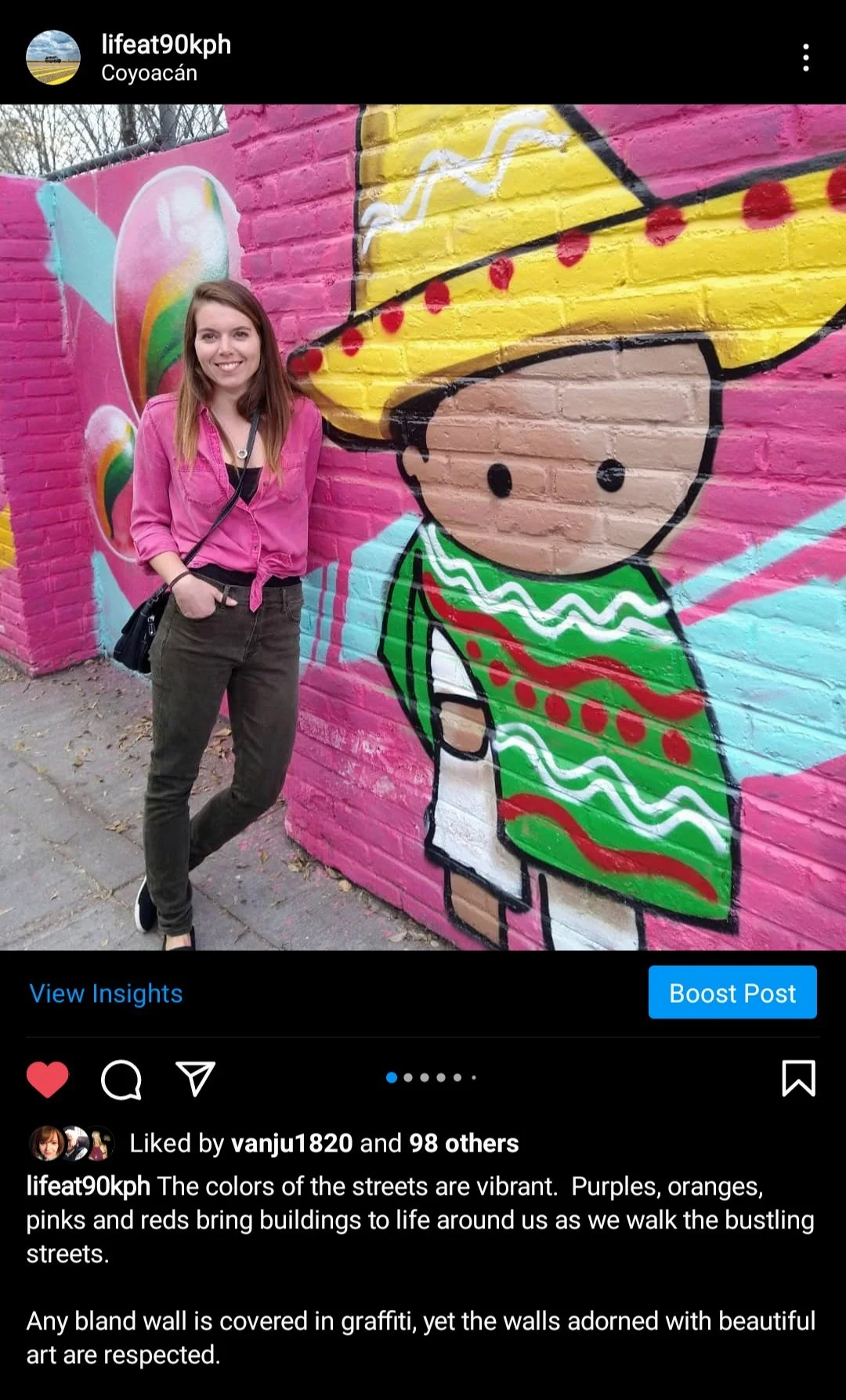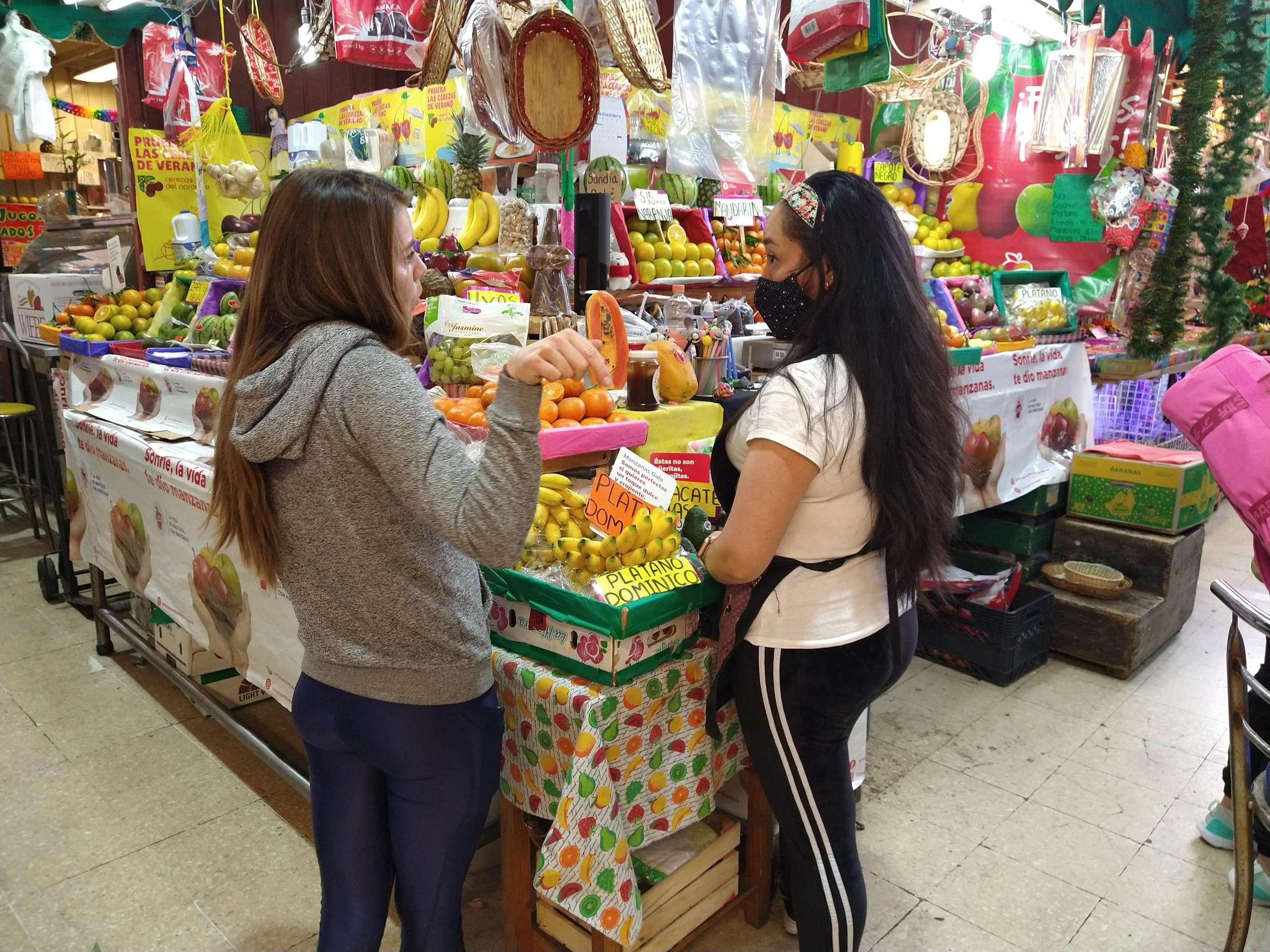Mexico and the City

It’s often said that any big city is just another big city. And while that may be true when it comes to things like the bustle of everyday life, homelessness, transit systems, crime, and the like, it is also undeniably true that each big city around the world has its own flavour. Because Mexico City, boy, sure doesn’t feel like Ottawa.
Markets aren’t just for fruits and veggies. Here, we take a stroll through Coyoacan’s outdoor book market. All your favourites, translated into Spanish!
As you may well know by now, Braden and I aren’t much into the tourist beat. And while its an inescapable truth that in a place like Mexico we’re seen as turistas (my blue eyes and fair skin and Braden’s height are the obvious give-aways), we do our best to steer clear of tourist traps. Although some tourist destinations offer cool experiences unattained anywhere else, they’re often overpriced, and end up feeling inauthentic. This time around in Mexico, if we couldn’t hunker down in our van in the desert or forest somewhere, we were going to live in the throng like all the other Mexicanos around us.
Naturally, this comes with a few first steps. One of the first things we did was to get ourselves a Mexican cellphone plan. In most places in Mexico, finding a Telcel retailer is no problem at all. If you’re near a street corner, you’re probably also near a Telcel. Their “Paquetes Amigo Sin Límite” are the best. For $200MXN (about $12 CAD), you get unlimited calling and texting in Mexico, the US, and Canada, plus unlimited social media use (Facebook (sorry, Meta?), Instagram, WhatsApp, Snapchat, and Twitter), and 3 gigs of additional highspeed data to use as you please. After the first 3 gigs you’re bumped to a slower speed, but most people only use social media anyway, so we’re covered. The packages are pretty incredible, and Telcel even sells pay-as-you-go BY THE DAY plans (for burner phones and poor people).
Market buildings are the best place to buy the cheapest goods, and you can get everything all under one roof from toys to produce, lunch to leather goods.
One thing that separates Mexico City from a city like Toronto, for example, is their city squares, or Zocalos. From our first venture into Mexico, three years ago now, we were enamored with the sense of community that these places created. In a small town, there might only be one square, but in a large city like Mexico City (over 20 million strong), there is at least one in every neighbourhood. The squares usually include a gazebo in the centre (or in Coyoacan where we stayed, a fountain), lots of landscaped bushes and trees, walking paths, and lots of park benches. All day long these squares are filled with people; lovers embracing on a bench for all to see, old friends gathering for coffee, a musician or street performer pedaling his or her skills for small donations, people selling treats like chapulines (fried, seasoned crickets), flan, cookies, or ice cream, or wares like hats, key chains, bracelets, and blankets. Fencing the square are usually businesses like restaurants, clothing stores, fruit and vegetable markets and - of course - a Telcel.
We were enamoured by the colourful murals found on nearly every building in this part of the city.
As Christmas approaches city employees are hard at work filling the square with colourful “Buena Noches”. We, of course, know them as Poinsettias!
Zocalos are places where the community comes together to be a community; they’re always busy. Early in the morning, or late into the evening, the benches are often full. They’re a place where often people are strolling, rather than hustling to and from somewhere. They create a reason to gather where otherwise there would be no reason, and because of their centrality, they’re often the meeting place. I imagine that in the days before cell phones, the zocalo was the unspoken place where people would meet each other. In the same vein as “same bat time, same bat channel”, the Zocalo would have been a place where two friends might meet for coffee on the same bench, every night at 7pm.
This guy was such a ham! Flirting with the ladies on benches nearby and making eye contact with Braden’s camera, he had people up and dancing by the end of his performance.
Another great (or, to some, perhaps not so great) thing about Mexico City - and really everywhere in Mexico for that matter - that you don’t tend to find in Canada is a truly laissez-faire attitude towards commerce, and life in general. Sure, it might be five in the morning, but if your neighbour is selling orange juice and wants to yell it from his rooftop, he’s going to. In Canada, you’d be pissed and call by-law, but here in Mexico, you just roll over and go back to sleep. That tinkling of the bells outside your door, that’s the milk guy; the whistle may just be the guy who sells tamales; the sonorous voice on the loudspeaker could be the guy who goes around buying and selling used refrigerators, stoves, and laundry machines. Literally everything is right outside your door, whether you want it to be or not.
Want a snack on your way home? Or how about some handmade lawn furniture? Either way, Mexico City has you covered!
This may sound like a headache waiting to happen, but Mexicans are so much more relaxed about letting people live their own lives how they see fit. Most people are trying to get by, and the entrepreneurial spirit is embraced and encouraged. The plus side is that if you want to sell cookies, tacos, bread, or even packets of gum in the park, or on the street, you can. No one’s going to stop you or ask to see your permit, and the cop is just as likely to buy what you’re selling as your neighbour. This means that when you’re walking down the street in Mexico City and you’re feeling a little peckish, you don’t have to stop in a restaurant (or even a fast food joint) and spend $10 - $20 on lunch, you can just hail the guy selling tacos, or the lady selling donuts and fill your belly immediately for less than $5. Or maybe you’re looking for a new cell phone case, key chain or change purse; you might just run into someone selling them on a street corner on your way home from work.
The laissez-faire attitude doesn’t stop at commerce, though. It extends to traffic rules (which can sometimes end badly, but often do not), pet ownership, street parking, or whatever. For example, there might be a stop sign, but if there’s no one else around, Mexicanos are way more likely to interpret that red, octagonal sign as a yield sign rather than a stop. Or, if there’s a free spot on the side of the road, it’s a valid parking spot. Or, maybe that street dog isn’t a street dog; it’s just taking itself for a walk. If you look closer, it’ll likely have a collar around its neck.
Coyota might look like a street dog, she may even have fleas like a street dog, but she’s well fed by a family who’d miss her if some well intentioned gringo (or Canadiense) picked up her for “adoption.”
Mexicanos are way more likely to assess a situation for themselves and make their own judgement call, rather than follow rules blindly. And sure, rules have their place, but they also come at the cost of our freedom to make our own decisions and live with the consequences of those decisions.
A little bit of English from Ann, a little bit of Spanish from Lyndsay, and somehow, we got it all figured out!
Mexico City is by far not the perfect place to live, but I wouldn’t say any big city is a perfect place to live. Inevitably, they’re loud, busy, polluted, and stressful. But I think the culture of Mexico, the camaraderie that Mexicanos seem to be born with, permeates the big city feel. For example, it’s not uncommon to see people dancing with abandon to a Mariachi band in the square in the middle of the day, and we’ve even been asked to share our Instagram account with the lady who sold us produce in the market. People here just seem happy, friendly, and like they care about those around them.
We had the best time in the big city, but we’re also looking forward to heading into smaller towns. Two weeks isn’t quite long enough to feel like we belong, but our next stop is Taxco, where we’ll spend a whole month. Maybe if we really love it, we’ll stay even longer. Either way, we’re confident that any town we land in will be unique, vibrant, and smell a whole lot like tacos.
Hasta luego….










